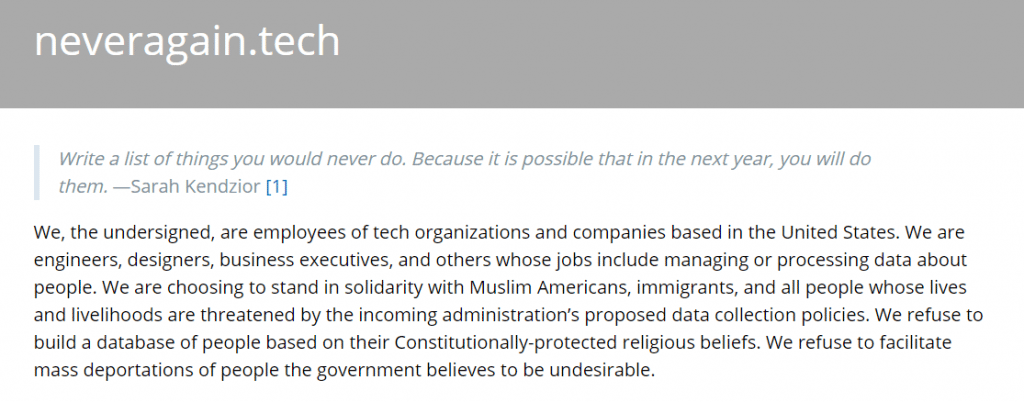SAN FRANCISCO, Calif.—Employees of major tech companies have signed a pledge refusing to help build a registry based on people’s religious beliefs.

The group, which describes themselves as “engineers, designers, business executives, and others whose jobs include managing or processing data about people,” said in their pledge that signatories will advocate to minimize collection and retention of data that could enable ethnic or religious targeting under United States President-elect Donald Trump’s administration within their companies, to fight any unethical or illegal misuse of data, and to resign from their positions rather than comply.
“We have educated ourselves on the history of threats like these, and on the roles that technology and technologists played in carrying them out. We see how IBM collaborated to digitize and streamline the Holocaust, contributing to the deaths of six million Jews and millions of others. We recall the internment of Japanese Americans during the Second World War. We recognize that mass deportations precipitated the very atrocity the word genocide was created to describe: the murder of 1.5 million Armenians in Turkey. We acknowledge that genocides are not merely a relic of the distant past—among others, Tutsi Rwandans and Bosnian Muslims have been victims in our lifetimes,” reads a part of the pledge.
The full pledge can be read below.
***
Write a list of things you would never do. Because it is possible that in the next year, you will do them.
– Sarah Kendzior
We, the undersigned, are employees of tech organizations and companies based in the United States. We are engineers, designers, business executives, and others whose jobs include managing or processing data about people. We are choosing to stand in solidarity with Muslim Americans, immigrants, and all people whose lives and livelihoods are threatened by the incoming administration’s proposed data collection policies. We refuse to build a database of people based on their Constitutionally-protected religious beliefs. We refuse to facilitate mass deportations of people the government believes to be undesirable.
We have educated ourselves on the history of threats like these, and on the roles that technology and technologists played in carrying them out. We see how IBM collaborated to digitize and streamline the Holocaust, contributing to the deaths of six million Jews and millions of others. We recall the internment of Japanese Americans during the Second World War. We recognize that mass deportations precipitated the very atrocity the word genocide was created to describe: the murder of 1.5 million Armenians in Turkey. We acknowledge that genocides are not merely a relic of the distant past—among others, Tutsi Rwandans and Bosnian Muslims have been victims in our lifetimes.
Today we stand together to say: not on our watch, and never again.
We commit to the following actions:
- We refuse to participate in the creation of databases of identifying information for the United States government to target individuals based on race, religion, or national origin.
- We will advocate within our organizations:
- to minimize the collection and retention of data that would facilitate ethnic or religious targeting.
- to scale back existing datasets with unnecessary racial, ethnic, and national origin data.
- to responsibly destroy high-risk datasets and backups.
- to implement security and privacy best practices, in particular, for end-to-end encryption to be the default wherever possible.
- to demand appropriate legal process should the government request that we turn over user data collected by our organization, even in small amounts.
- If we discover misuse of data that we consider illegal or unethical in our organizations:
- We will work with our colleagues and leaders to correct it.
- If we cannot stop these practices, we will exercise our rights and responsibilities to speak out publicly and engage in responsible whistleblowing without endangering users.
- If we have the authority to do so, we will use all available legal defenses to stop these practices.
- If we do not have such authority, and our organizations force us to engage in such misuse, we will resign from our positions rather than comply.
- We will raise awareness and ask critical questions about the responsible and fair use of data and algorithms beyond our organization and our industry.
(A full list of the signatories can be found here)



Be the first to comment